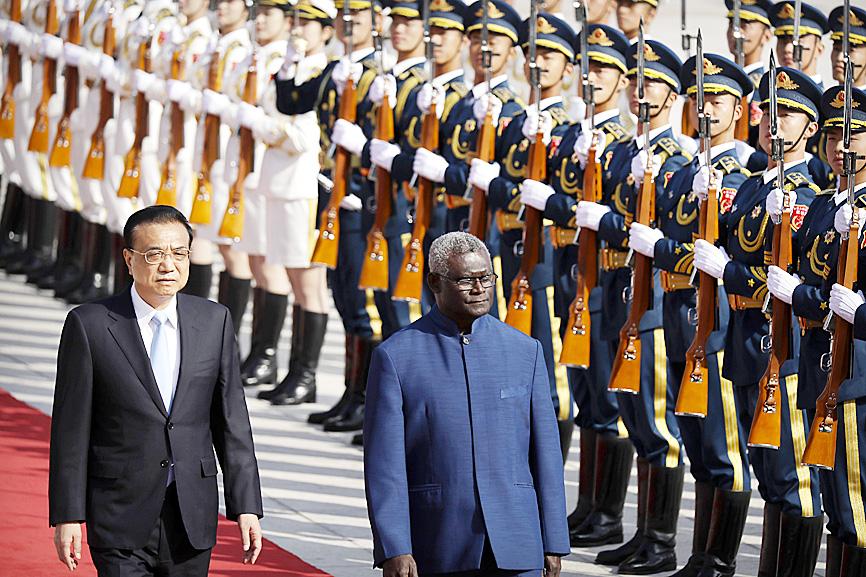China said it has signed a security agreement with the Solomon Islands, which had faced pressure from nearby Australia and the US to reject the deal.
Chinese Minister of Foreign Affairs Wang Yi (王毅) and Solomon Islands Minister of Foreign Affairs Jeremiah Manele “officially signed an intergovernmental framework agreement on security cooperation the other day,” Chinese Ministry of Foreign Affairs spokesman Wang Wenbin (汪文斌) said yesterday at a regular news briefing in Beijing.
“The two sides will conduct cooperation, including maintenance of social order, protection and safety of people’s lives and property, humanitarian assistance and natural disaster response, to help the Solomon Islands strengthen capacity-building and safeguard its own security,” Wang Wenbin said.

Photo: AP
US National Security Council Indo-Pacific Affairs Coordinator Kurt Campbell plans to lead a delegation of US officials to the South Pacific nation in the coming days, a White House statement said.
The tour is to include Hawaii, Fiji and Papua New Guinea.
“The delegation will meet with senior government officials to ensure our partnerships deliver prosperity, security and peace across the Pacific Islands and the Indo-Pacific [region],” the statement said.
Earlier this month, Australian Minister for International Development and the Pacific Zed Seselja made an unusual mid-election campaign trip to the Solomon Islands, where he publicly asked the Pacific nation’s leadership to “consider” not signing the security pact with Beijing.
The flurry of diplomacy was sparked by the leaking of a draft agreement late last month between the Chinese government and the Solomon Islands that allowed the deployment of China’s security forces in the case of domestic unrest.
The agreement also facilitates a safe harbor for Chinese naval vessels just 2,000km from the Australian coastline.
Speaking to Australian Broadcasting Corp on Sunday, Australian Minister for Foreign Affairs Marise Payne said the government was concerned about a “lack of transparency” in the security agreement.
However, Solomon Islands Prime Minister Manasseh Sogavare has said that the pact would not allow China to construct a military base and has strongly asserted his country’s right to an independent foreign policy.

A magnitude 5.6 earthquake struck off the coast of Yilan County at 12:37pm today, with clear shaking felt across much of northern Taiwan. There were no immediate reports of damage. The epicenter of the quake was 16.9km east-southeast of Yilan County Hall offshore at a depth of 66.8km, Central Weather Administration (CWA) data showed. The maximum intensity registered at a 4 in Yilan County’s Nanao Township (南澳) on Taiwan’s seven-tier scale. Other parts of Yilan, as well as certain areas of Hualien County, Taipei, New Taipei City, Taoyuan, Hsinchu County, Taichung and Miaoli County, recorded intensities of 3. Residents of Yilan County and Taipei received

Taiwan has secured another breakthrough in fruit exports, with jujubes, dragon fruit and lychees approved for shipment to the EU, the Ministry of Agriculture said yesterday. The Animal and Plant Health Inspection Agency on Thursday received formal notification of the approval from the EU, the ministry said, adding that the decision was expected to expand Taiwanese fruit producers’ access to high-end European markets. Taiwan exported 126 tonnes of lychees last year, valued at US$1.48 million, with Japan accounting for 102 tonnes. Other export destinations included New Zealand, Hong Kong, the US and Australia, ministry data showed. Jujube exports totaled 103 tonnes, valued at

BIG SPENDERS: Foreign investors bought the most Taiwan equities since 2005, signaling confidence that an AI boom would continue to benefit chipmakers Taiwan Semiconductor Manufacturing Co’s (TSMC, 台積電) market capitalization swelled to US$2 trillion for the first time following a 4.25 percent rally in its American depositary receipts (ADR) overnight, putting the world’s biggest contract chipmaker sixth on the list of the world’s biggest companies by market capitalization, just behind Amazon.com Inc. The site CompaniesMarketcap.com ranked TSMC ahead of Saudi Aramco and Meta Platforms Inc. The Taiwanese company’s ADRs on Tuesday surged to US$385.75 on the New York Stock Exchange, as strong demand for artificial intelligence (AI) applications led to chip supply constraints and boost revenue growth to record-breaking levels. Each TSMC ADR represents

TRUST: The KMT said it respected the US’ timing and considerations, and hoped it would continue to honor its commitments to helping Taiwan bolster its defenses and deterrence US President Donald Trump is delaying a multibillion-dollar arms sale to Taiwan to ensure his visit to Beijing is successful, a New York Times report said. The weapons sales package has stalled in the US Department of State, the report said, citing US officials it did not identify. The White House has told agencies not to push forward ahead of Trump’s meeting with Chinese President Xi Jinping (習近平), it said. The two last month held a phone call to discuss trade and geopolitical flashpoints ahead of the summit. Xi raised the Taiwan issue and urged the US to handle arms sales to